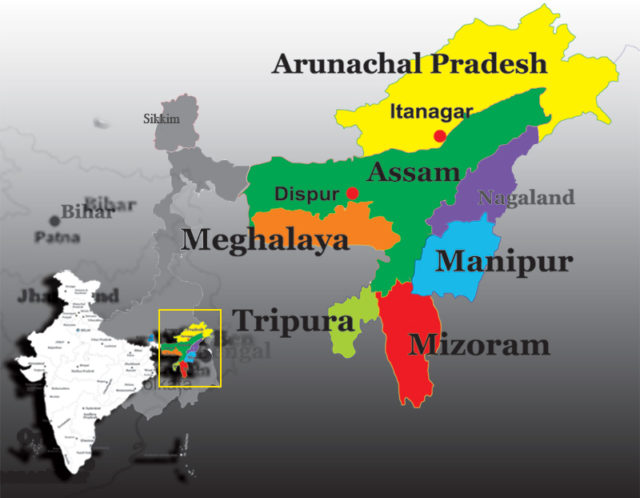Northeast India consists of seven states of Assam, Arunachal Pradesh, Meghalaya, Nagaland, Manipur, Mizoram and Tripura. This region is extremely important from international strategic dimension and is a vital part of the nation’s security architecture. The strategic location and abundance of natural resources makes the region an attractive destination for development and a dynamic source of energy, including the perennial water sources from the river Brahmaputra and its tributaries. Its proximity to international markets of South-Western China and South-East Asia, makes this region a potentially important base for investors too.

The North Eastern India however has unique problems arising out of- the remoteness and poor connectivity, hilly terrain, weak financial resource base, poor infrastructure, sparse population density, the insurgency plaguing the states, and shallow markets; above all, it does not have very cordial relations with neighbouring countries except Bhutan. Critical to improving connectivity are issues of diplomacy and improvement in border infrastructure and trade facilitation with neighbouring countries, particularly China and Bangladesh. China is, and will continue to be the major adversary with inimical intent and pro-active plans to increase its influence in the region. China’s overtures to Bhutan can have a profound effect on the security calculus in case the Bhutan-China borders are altered. Bangladesh, Sri Lanka and Nepal also require constant attention while Myanmar holds the key to peace and security on the Indian side of the border.
Internal Security
3Northeast is among the most complex regions in Asia, with over 200 ethnic groups and as many languages and dialects. Even the British had to face a great deal of difficulty in dealing with the tribal population. After Independence, the Constitution of India provided in the Sixth Schedule, for setting up of autonomous district councils as second-tier of governance with control over many subjects. Other special arrangements also exist under Article 371 of the Constitution for Nagaland, Meghalaya, Mizoram and hill areas of Tripura and Assam, while some areas in the region like Arunachal Pradesh, Manipur, Tripura and Assam are covered by 73rd and 74th amendments. At the village level, the states often depend on traditional institutions. In spite of all these provisions, insurgency in the North Eastern states is as old as Independence of India and has spread its tentacles throughout the region. The Armed Forces (Special Powers) Act was passed in 1958 to crush the rebels but till today, no solution has been found to this ever-expanding menace.
At present, over thirty insurgent groups are operating in the region running parallel governments, having their armed cadres, collecting taxes, extorting money and terrorizing people. Many of these groups have trans-border linkages with the countries inimical towards India offering overt and covert support to the insurgents. For achieving success against the insurgents, India needs cooperation and co-ordination with the neighbouring countries from whose soil insurgents activities originate. Security matrix in this region is made up of many imponderable factors many of which exist outside the region. Growth of fundamentalists, extremists and ideologically based terrorism with cyber warfare as a hydra monster is giving internal security matrix in the region a prominence not possible to ignore. Recent violence in the states of Assam, Manipur and now Nagaland are clear examples of the same.
The problem of insurgency in the North East being highly complex needs a multi-pronged strategy as military operations and distribution of funds alone is not the way forward. Some of these measures could be:-
- Peace talks with insurgent groups within the Indian constitution and clear terms about non acceptance of use of violence against Indian sovereignty.
- Improved economic, military, cultural and diplomatic ties with the neighbouring countries including solving the border disputes and flexibility to carry out trans-border raids on insurgent camps.
- Better governance without political agenda making local institutions like autonomous Hill Councils and traditional village bodies more representative and providing professional and skill education to the locals leading to gainful employment opportunities for them.
External Security
Main concern of national policy makers remains China. With China’s extending influence in the region through Myanmar, Vietnam and Sri Lanka in a bid to circle the Indian peninsula it is imperative that the national security planners give a deep thought to existing and future needs in the North East region. Besides the internal strife due to ethnic and financial disparity the safeguarding of borders in a conventional and non-conventional mode is imperative. Re-alignment of military formations in the region with army being made solely responsible for guarding borders and LAC assisted by BSF, SSB and ITBP and the internal security being delegated to Assam Rifles would be in order. More and more emphasis has to be given to covert operations to counter similar actions by the Chinese in the region. Sealing of porous borders with Myanmar and Bangladesh in line with diplomatic engagements with the Govts of these countries would make things better. Myanmar’s return to the international mainstream has opened up many challenges for India; the most important one being to keep the process of democratisation on track however this is a golden opportunity to counter influence of China in the region. Border agreement with Bangladesh Govt was a correct decision resolving decades old international problem and putting a balm on ruffled feathers internally.
Focus East
The time has come for recognizing the need for specific focus to this region. The Northeast states require a prominent place in national security calculus, not only to enhance and dictate the nature, pace and growth of economic activities but also to take pro-active steps in the evolving national security paradigm of “Look and Act East Policy” in tune with the ever-changing international security environment. Growth and prosperity are far better remedies for insurgency. A major cross ministerial synergised effort as a cogent policy is required to convert the inherent strengths of the region into result-oriented objectives of our economic progress and safeguarding national interest against internal and external threats.






























